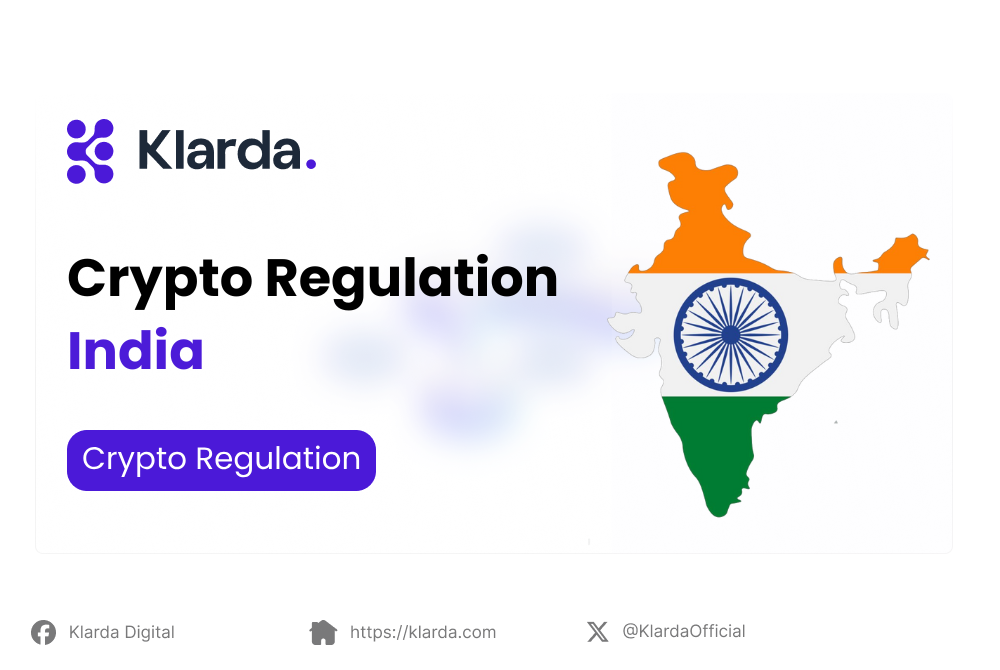Crypto Regulation In India
India, as a recent entrant into the cryptocurrency market, has garnered significant attention regarding crypto regulation india.
Cryptocurrency is a form of virtual asset that operates on a decentralized network spread across a large number of computers. It represents a decentralized form allowing cryptocurrencies to exist outside the control of central governments or regulatory bodies. The Indian government provides comprehensive crypto regulation india to facilitate easy participation and entertainment. Explore the details below with Klarda to gain further insights.

KEY TAKEAWAYS
- The Indian market is witnessing a surge in activity among developers and startup communities engaged in blockchain technology.
- Despite challenging legal and tax environments, India has emerged as the world's second-largest cryptocurrency market.
- Currently, India imposes higher taxes on cryptocurrency compared to most countries, with a 30% profit cut and a 1% tax on all transactions. The uneven application of transaction taxes may pose a threat to domestic cryptocurrency exchanges.
IS CRYPTOCURRENCY IN INDIA?
Cryptocurrency as a means of payment in India is not regulated by any central authority. There are no rules and regulations or any guidelines set to resolve disputes when dealing with cryptocurrency transactions. As a result, cryptocurrency transactions are conducted with investor risks.
India's Finance Minister, Nirmala Sitharaman, proposed taxing digital assets, fueling the ongoing debate on the legality of cryptocurrency in the country. While many have accepted the decision to tax virtual currency as a first step in its recognition, the government has not provided any official explanation on whether digital currencies like Bitcoin are legal in India.
Based on various statements from different authorities, including the Reserve Bank of India Governor and several government spokespersons, one may conclude that cryptocurrencies are not illegal, but there is no specific ban on them in India. They are not regulated, but according to the recent Union Budget 2022, the Indian government announced a 30% tax on cryptocurrency profits and a 1% tax deducted at the source.
HOW DOES CRYPTOCURRENCY TAXATION WORK IN INDIA?
There are two layers to India's new cryptocurrency tax. The first layer is the capital gains tax, where you are required to pay a 30% tax on any amount earned from digital asset transactions.
This is quite standard, and many countries, such as the United States and the United Kingdom, also have a similar form of tax for cryptocurrency. However, the issue here is that you cannot offset your losses, even in cryptocurrency. So, if you incurred a loss of Rs.1,000 ($13.13) from a Bitcoin transaction and earned Rs.1,000 ($13.13) from an Ethereum transaction, you would still have to pay a 30% tax on the amount earned.
CRYPTOCURRENCY COMPANIES IN INDIA ARE UNDERGOING MIGRATION
According to the 2021 Reserve Bank of India (RBI) remittance survey, 30% of Indians residing in the United Arab Emirates (UAE) contributed to 18% of the total $110 billion remitted back home. This not only reflects a robust financial relationship between the two countries but also extends into the Web3 space - an advanced version of the Internet based on blockchain, marking a new phase in bilateral relations.
While India continues to lead in the adoption of cryptocurrencies at the grassroots level, recent tax regulations have significantly reduced transaction volumes, prompting many activities to shift to alternative channels.
CHALLENGING ROAD AHEAD FOR CRYPTOCURRENCY INVESTORS IN INDIA
For cryptocurrency investors in India, the road ahead is challenging due to significant uncertainties surrounding tax regulations. They will need to monitor their investments and report to the income tax authorities at the end of the financial year. With the decentralized nature of De-Fi, keeping track of all transactions and applying a 1% TDS (Tax Deducted at Source) can be challenging.
While Indian organizations may deduct 1% for all digital asset transactions, it remains unclear whether global companies will comply with this rule. Shetty notes that the complexity of tracking transactions and the inability to offset losses may lead to many tax violations at the end of the financial year, which is not a positive sign for any investment vehicle.
The crypto regulation india industry in India is still engaging with authorities to soften some regulations. One proposal they have put forward is to reduce TDS from 1% to 0.01%. Sogani points out that these rules could adversely affect foreign exchanges and DeFi companies looking to invest in India. He adds that clear guidelines and regulations on cryptocurrency would prevent people from becoming resistant to investing in them.
Currently, there are no specific laws regulating cryptocurrency apart from tax rules. Reports suggest that crypto regulation india will review global in the industry to formulate its regulatory framework. However, this is not expected to happen within a few months. Uncertainty and hesitation persist around cryptocurrency investments in India at present.
Updated 9 months ago